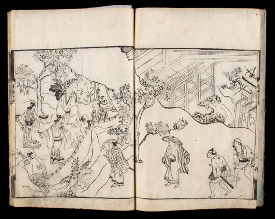Stories of a “floating world.” Professor Scott Black, Department of English, discusses his newly published article, “Saikaku’s Evanescence.”

Professor Scott Black
Scott Black, Professor in the Department of English has published a new article, “Saikaku’s Evanescence,” in Studies in Eighteenth-Century Culture 53 (2024). The essay contributes to the comparative study of global eighteenth-century literature. In this essay, Professor Black uses Saikaku Iharu’s innovative stories of the “floating world,” Five Women Who Loved Love (1686), to ask about our conceptions of modernity and modern literature.

Professor Black explains:
One of the major writers of the Edo period and an innovator in early modern Japanese prose fiction, Saikaku’s “stories of the floating world” (ukiyo-zoshi) were among the most successful works written for a popular urban audience. In this paper I ask, how modern is Saikaku? Or more exactly, could his undoubtably modern work change the ways we think about modern literature? As a new form of prose narrative for and about a rising merchant class, Saikaku’s fiction beguilingly resembles the roughly contemporary “rise of the novel” on the other side of the world. Part of a new popular culture that upended traditional morality, ukiyo-zoshi expressed the pleasures of the yūkaku (the licensed red-light districts), featured ordinary characters, and circulated broadly to disseminate these modern attitudes in a cheap form of print. And Saikaku’s work is often read as a new form of realism. But in this paper, I reverse the vector of analysis. Instead of asking how our categories can explain Saikaku’s new form of fiction, I ask if his work might help us reconsider our assumptions about modern fiction. I suggest that if Saikaku is modern, it’s not in his ironic undercutting of traditional values, but rather in his ironic relation to both tradition and modernity.
